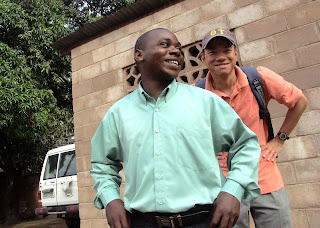Today I am tagging along with Sister Rose on a trip to Mansa, the capital of Luapula province, one hundred kilometers or two hours away from Lubwe.
 Inside the convent
Inside the convent
Sister Rose, the hospital administrator

Kalumba the driver detailing the Landcruiser

These guys love 50 Cent
When I came into the country at Lusaka Airport, I had to fork over US$100 for a visa, the most expensive visa I have ever gotten. To add insult to injury, they only gave me thirty days and told me that I would have to apply for a temporary permit during that time so I can stay the full two months. So Mansa is the closest place for me to take care of that. I go into the immigration service office in the middle of town and explain to them my situation. After a while, I am called into an office. The official tells me to write an application, attach a couple of passport photos, and pay one million kwachas. “One million kwachas?!” I exclaim, “That’s almost three hundred US dollars!” Together with the visa at the airport, I will have paid almost four hundred dollars to stay in the country for two months. Facing the prospect of having to bleed for that privilege, I calmly explain to him that I am a medical student working at a hospital for two months; I will only need one month of extension on the visa. “Can I apply for a study permit instead?” I ask hopefully. “That one is cheap; it’s only 250,000 kwachas (US$65),” says the officer. Seeing a potential drop in price, I ask, “Can I apply for that one then?” “You’ll have to go to Lusaka for that; we don’t do it here.” My heart sinks. It means extra expenses and at least two weekdays to travel to and from Lusaka. I consider bribing the officer, but decide against it when he gives no hint of being open to such backroom deals; plus the poster on the wall sternly warning against corrupting officials means I may get in more trouble than I bargain for. I again explain to him my situation, emphasizing the part that I am a student and that I only need a month of extension in my passport. After a pause, the other official in the room takes my passport and says he will be back. I sit down in the couch and make awkward small talk with the officer in the room. After five minutes, the official comes back and tells me, “I understand your situation. You can come back the day before the visa expires and we’ll give you another thirty days. You won’t have to pay anything.” Pleasantly surprised and almost not believing what I have heard, I thank him profusely. Wow, from having to pay almost $300 to getting a visa extension for free, all without a cent of bribery – that is the most flexible rules I have seen and the most clean officials I have met.
 Christian is one of the accountants at the hospital
Christian is one of the accountants at the hospital
The hospital on the left, the guesthouse on the right
With that taken care of, the next order of business is to change money. In the past, I had always traveled with cash in US dollars and my ATM card. For some reason, I decided to take traveler’s checks to Zambia. I dart in and out among the three banks in town to check on their exchange rates. The Zambian kwacha has appreciated against the US dollar quite a bit in the last few years (that shows how weak the US dollar has become – it’s falling against even the currency of one of the poorest countries in the world). I am then reminded that dealing with banks in third-world countries is only slightly less frustrating than trying to cut through the red tape of government agencies. After two hours of running in and out of the banks, I find out that, in this town, my traveler’s checks are worth about as much as the paper they were printed on. Defeated, I scrape together US$200 cash to change at the Zambian National Commercial Bank. After disappearing for a half hour, the teller comes back with forms in quadruplicate with a half dozen rubber stamps. After paying a hefty commission, I finally get my small stack of kwachas. Note to self, never ever take traveler’s checks to travel, ever again!

A villager riding one of the ubiquitous Chinese bikes

After jumping through the two bureaucratic hoops, it is now time to do some grocery shopping. We go to ShopRite, a South African grocery chain, in front of which some beggars and street hawkers hang out. This is the closest place to Lubwe with a supermarket where meat is available. It is a smaller version of a standard supermarket with a much smaller selection. Who needs a hundred different teas, fifty varieties of yoghurt, and a dozen cuts of the same meat anyway? I pile the grocery cart high with staples like rice, potatoes, and maize meal, and enough meat for a couple of weeks. After this, it may be a while before I have a chance to go grocery shopping. My meals will be supplemented with vegetables grown around in the guesthouse and what I can buy at the Lubwe village market.

Sister Rose in the rear view mirror

On the way back to Lubwe, I continue my shopping by picking up tomatoes and sweet potatoes sold by farmers on the side of the road. By the time we roll into Lubwe, the sun has set and the whole village is enveloped in darkness – yes, power is out again.












No comments:
Post a Comment